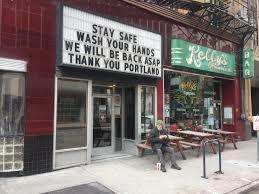BEHIND THE MASK, July 28
This week, we consider the question — how does one think of one’s own community in time of traumatic rupture, and does that provide opportunity for creative change?

One article considers this explicitly, even if it addresses Covid only glancingly. It’s about the various holders of political power in Portland, Oregon, and how the interaction of those power centers has changed — with Covid, and with protests. (https://hardcrackers.com/portland-report/) The observation that hit me with most force was this: how does one pursue change under material limitations? In other words: people tend to focus on what’s scarcest for them, so how can it seem natural to redraw boundaries to include others? (Think about the school meetings you might be part of, for instance.)
The other doesn’t mention change in political structures at all – it’s a piece from a few weeks ago, asking whether Chasidic Jews have achieved herd immunity. That question itself, however, seems secondary (it’s difficult to answer precisely, and it’s likely not the case). Most interesting is how Chasidim (or anyone) make decisions; who they find trustworthy; what institutions they have recourse to. Check out the mention of networks of physicians that some Chasidim of certain types found useful. (Would love a history of how these emerged.) https://www.jta.org/2020/07/08/health/brooklyns-hasidic-jews-are-acting-like-they-have-herd-immunity-could-they-be-right

One article considers this explicitly, even if it addresses Covid only glancingly. It’s about the various holders of political power in Portland, Oregon, and how the interaction of those power centers has changed — with Covid, and with protests. (https://hardcrackers.com/portland-report/) The observation that hit me with most force was this: how does one pursue change under material limitations? In other words: people tend to focus on what’s scarcest for them, so how can it seem natural to redraw boundaries to include others? (Think about the school meetings you might be part of, for instance.)
The other doesn’t mention change in political structures at all – it’s a piece from a few weeks ago, asking whether Chasidic Jews have achieved herd immunity. That question itself, however, seems secondary (it’s difficult to answer precisely, and it’s likely not the case). Most interesting is how Chasidim (or anyone) make decisions; who they find trustworthy; what institutions they have recourse to. Check out the mention of networks of physicians that some Chasidim of certain types found useful. (Would love a history of how these emerged.) https://www.jta.org/2020/07/08/health/brooklyns-hasidic-jews-are-acting-like-they-have-herd-immunity-could-they-be-right
Published on July 29, 2020 06:19
No comments have been added yet.



